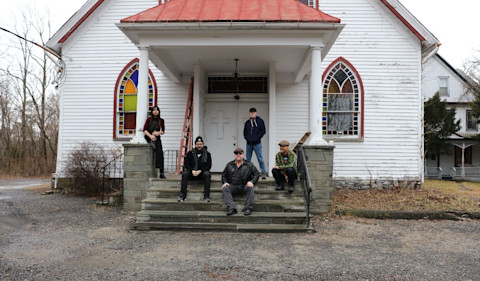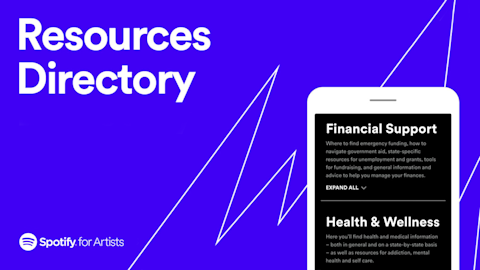Strategies for keeping up your momentum and producing music you love.
The "sophomore slump" is one of the most dreaded phenomena in music. As a well-worn saying in the industry goes: “You’ve got your whole life to make your first album and a few months to make your second.”
There are all sorts of reasons that second records frequently perform worse than debuts. Artists may get pushed to follow up their first album in a rush, so they don't have enough time to focus on developing their craft. Critics and fans might react negatively to a creative decision to change the vibe that established the artist. Or, on the contrary, people might tire of hearing more of the same. But it's important to remember (always), an album's performance and critical reception are not necessarily accurate ways to measure its quality. For you as an artist, the most important thing is to stay true to your creative impulses, regardless of peripheral noise.
“I hesitate to say this is universal advice, because it was what worked for us, and maybe it doesn't work for everybody,” Stefan Babcock from Toronto punk heroes PUP says. “But for a band like us, the things that really derailed certain things on the second record were having the conversations like, 'Oh, do we think this song could be on radio?' or 'Do we think Pitchfork or whoever is going to write about this song?' That stuff is poison in our band. So we don't fuck with that stuff anymore.”
PUP followed up their 2013 self-titled debut record with 2016's stellar The Dream Is Over, and have since kept on chugging with their excellent third album, 2019's Morbid Stuff. We caught up with Babcock to gather some ideas about how artists can stay on top of their game.
Block out the noise
A sophomore record can suffer from a lot of outside pressure on top of the pressure you’re already putting on yourself. Babcock knows that he and the rest of his bandmates have high expectations of themselves, so they made a conscious effort to not let pressure from labels, agents, and other outside sources get in their heads.
“Going into making that second record, we all had these expectations that we wanted to make a record that we were going to be more proud of than the first record, and not really think about what other people were going to think about it,” Babcock says. “I feel like that's probably how a lot of bands get into trouble—overthinking what other people are going to make of their records.”
Work harder
In the years between PUP and The Dream Is Over, the band toured about 250 dates a year. While spending most of their time on the road took its toll, touring also made the band tighter, and allowed everyone to bond and, in Babcock’s words, learn “what was wrong with everyone’s brain so that we can be sensitive to that.”
“Touring really makes you a better unit and a more cohesive group and better at working together creatively,” Babcock says. “But the other side of that coin is that if you tour too much, you don't leave yourself any time to write music. So I think we kind of landed in the sweet spot where we toured so much that we got really comfortable with each other, and then we were smart enough to shut it down when we knew we had to write another record, and gave ourselves a few months to do it. Rather than coming off tour and going into the studio and being like, 'OK, I guess we'll figure it out.'"
The band committed to practicing five times a week when they were writing The Dream Is Over, regardless of whether they were feeling inspired. A lot of the time, those rehearsals could be disappointing, but staying in the habit kept their creative wheels turning.
“It's hard to break through that wall,” Babcock says. “We've struggled with that so much, but we also have the confidence in each other that if we just keep going, something will click eventually. If it doesn't, what other choice do we have? We're a band. Our job is to make records. We have to. We just have to. And when it starts to work, it's really fun. It's the best feeling in the world.”
Plus—you don’t want to let down your friends. Not in a band with your friends? Find someone you can use as a sounding board for your ideas, who will help you stick to your plans.
Work smarter
With regards to practicing, Babcock believes there are certainly people out there with a "spark of genius," but he isn’t one of them. All he has to offer, he says, is hard work. So when he has time off touring, he keeps himself to a strict schedule—around 8:30am to 12:30pm every day—during which he doesn’t look at or answer his phone, shuts out other distractions, and just writes music. The idea being that if you write garbage every day for two months, you’ll probably eventually come up with something good. The important part is to work the writing muscles.
“At the beginning of the process of writing The Dream Is Over I was really kind of creatively drained,” Babcock says. “Nothing was really coming to me and I decided I would write a song every week, no matter how bad it was. A full song—verses, chorus, bridge, full lyrics, everything. Even vocal harmonies. And I did that. I wrote a song a week for about two months. None of those songs were very good or made the record. But it got me in the mode so that when I did feel inspired, it was really easy for me to capture it.
“Writing that first record, I would feel inspired and then it would take me months to crystallize how to say what I wanted to say,” he adds. “That's just not not a great way to write your second record.”
And know your limits so you can plan accordingly. Babcock understands now that he can’t write anything on the road, so he takes some extra time between touring and recording to get things written and ready.
Trust your instincts, and don’t rest on your laurels
Becoming too content with your work can easily lead to half-baked ideas or going through the motions. If you personally feel like it’s not a jam, audiences will also probably feel like it’s not a jam.
“One thing to avoid that I think is kind of universal would be complacency,” Babcock says. “Don't think because people liked your first record that you can take a shit and everything will be fine. What made your first record special is that you were in love with all of the stuff that was on it or most of the stuff that was on it. And if you're not in love with what you're doing on your second record, it's probably not good enough. You should probably work harder at it.”
And finally, it’s worth pointing out that enjoying yourself is important—not only because you shouldn't waste your life doing something you don't enjoy, but also, who really wants to listen to a band having a bad time?
“Have fun,” Babcock says. “Because you're playing music—maybe for a living or maybe just for fun. It doesn't matter. You're doing it because you like it. Even if your records are miserable-sounding, there's still some joy to playing music that you probably had on your first record. You can't lose that when you're making the next one just because it's become work.”
—Matt Williams
Popular Stories
video
How Julia Wolf Made It




